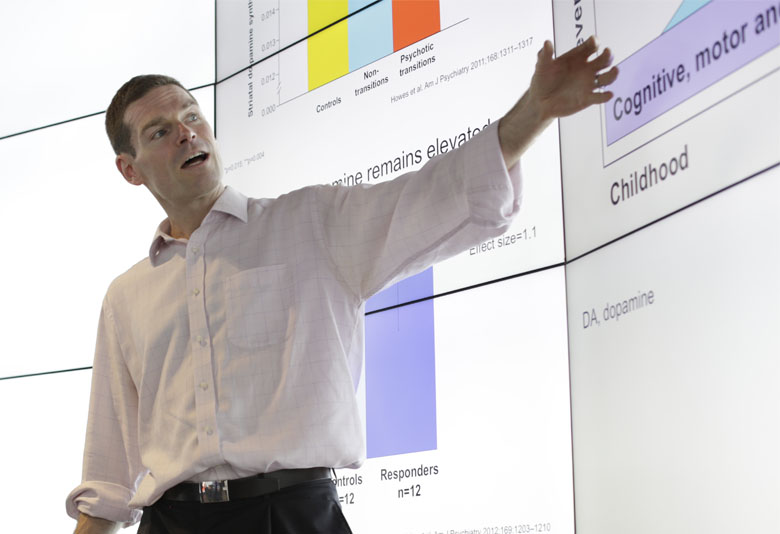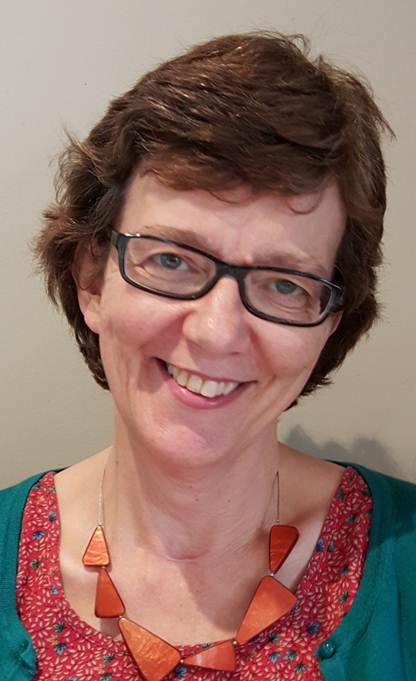By Helen Figueira
December 16, 2016
Time to read: 7 minutes
By Deborah Oakley
Chart-topping Christmas singles might be interpreted as a musical portrayal of mental health, said John Aggleton, president of the British Neuroscience Association, as he opened the association’s Christmas symposium this week.
He joked that “Don’t You Want Me Baby” by The Human League speaks of rejection, whilst the Pet Shop Boys’ “Always On My Mind” leans towards obsession, and the Spice Girls’ “2 Become 1” could be about an associate identity disorder. Aggleton then let Bob the Builder set the tone for a day which explored possible treatments for brain conditions, with its unforgettable theme tune, “Can we fix it?”
Beneath the merry atmosphere was a serious purpose. Mental illness affects one in four people in the UK, and the symposium focused on mental health with speakers exploring the latest research on addiction, psychosis and anxiety.
One, Oliver Howes, who leads the Psychiatric Imaging group at the MRC London Institute of Medical Sciences (LMS), said he’d like future drug development to make better use of insights gained from neuroscience research. “We’ve got a huge number of drugs, the situation should be rosy in treating psychosis. Yet when you look at disease burden it’s up there with the top causes of ill health and disability across the world.” This is partly because current treatments don’t work in around one third of people with psychosis, he said. New drugs have aimed to fill this void but many have failed in clinical trials. According to Howes, this is because they have been developed without a clear understanding of the brain changes that lead to psychosis.
Since these initial trials, researchers have shown that anti-psychotic drugs act best at a particular brain receptor occupancy: too little and there’s no effect; too much and there are too many side effects. Howes said that some of these old, failed drugs might now prove effective if given at the dose needed to hit a ‘sweet spot’ of exactly the right dose. “We need neuroscience because the past approach is like playing darts when you’re blind folded,” he said. “Neuroscience can help us because we have ways of measuring what’s going on in our patients’ brains, and linking that with clinical outcomes.”

Peter Bullimore, chair of Paranoia Network, presented a challenge to clinical psychiatrists like Howes. Bullimore told the audience that he first began hearing voices after being abused as a child, and that he spent many years on heavy medication. It was only when he moved away from what he described as the psychiatric approach and explored the meaning of his voices that he recovered.
There never has been any scientific validity for schizophrenia, said Bullimore. Instead, he suggested, psychosis is a natural response to trauma. He asked psychiatrists to truly listen to their patients to pick up on signs of suppressed trauma. An individual may be unable to articulate their experiences, he said, but the language they use can give subtle hints that there’s an all too real story behind the thoughts and voices they hear. According to Bullimore, these voices are often wrongly labelled as ‘delusional’ by the medical profession. “Everybody has the capacity to recover as long as we do not define recovery. If you focus on what a person can do, people can, and do, recover.”
Howes agrees it is important to focus on recovery but takes a more integrative approach. “There is a healthy discussion taking place about how we classify and diagnose schizophrenia. Trauma plays a role for some people, but careful studies show it is not a factor for the majority of patients. It is also important to remember that schizophrenia is highly heritable, with genes contributing 60-70% of the risk for the disorder. The really interesting thing to emerge recently is that psychological and biological explanations of the condition converge. Currently, the best model we have integrates social and environmental influences in early life with genetics and functional changes in the brain.”
Bullimore captivated the scientific audience with his powerful and moving talk. Aggleton said: “I think you’ve made us all feel rather small actually, because we just see the world through our own eyes and views. When you hear about things from a different perspective, suddenly you open your eyes to the fact that actually we do have to embrace many different views and approaches. I think as scientists we have a terrible habit of a very narrow approach driven by orthodox science and an orthodox view that we adhere to.”
Another speaker, with an unusual perspective on how Christmas celebrations might affect our brains, was Anne Lingford-Hughes of Imperial College London. Lingford-Hughes said that during the course of her research she’d administered alcohol to people through intravenous drips whilst inside a brain scanner. She has also asked postgraduate volunteers to drink the equivalent of four to five pints of strong beer within a few hours, taking them to double the ‘drink drive’ limit. The intoxicated volunteers then took part in learning and memory tasks, though some could only remember one word, compared to 10 to 12 in sober participants. Their sluggish learning and sleepiness was improved when Lingford-Hughes gave them a particular pharmaceutical drug.

She was at pains to point out that she’s not suggesting we add drugs to our drinks to help us remember what happened the night before. Instead, she says this study and others suggests there is “a specific neuroscience to alcohol addiction”. She went on to say that there are some precise psycho-pharmalogical tools that might be used to improve treatment.
Alcohol can fuel antisocial behaviour, and at Christmas we often see images of drunken Santa Claus whilst Mrs Claus appears more sober, Louise Arseneault of King’s College London told the meeting. This is fairly representative of antisocial behaviour, she said, which is more common in men than women. Arseneault said there’s a need to tease out those who are antisocial for a brief period during their rebellious teens, from those who show persistent antisocial behaviours in childhood, through adolescence and into adulthood. These persistent offenders are at risk of mental health problems and, if identified early, could be helped.
“This is a very, very small proportion of the population. Young children who, before they enter school, show naughtiness in every area of their life,” said Arseneault. Her research has shown that much of the variation in how antisocial we are is controlled by our genes, though she added, “genetic doesn’t mean it’s deterministic.”
Her work chimed with a study published this week in Nature Human Behaviour, which suggests that brain tests at a young age can predict a child’s chance of becoming a criminal and receiving social welfare payments and medical prescriptions later in life.
Despite the importance of mental health research, it’s drastically underfunded when compared to public investment in cancer research, said Sophie Dix of MQ, which stands for Mental Health Quality of Life. The charity was founded in 2013 to fund multi-disciplinary research on mental health across the biological, psychological and social sciences. Dix invited applications to an unusual Dragon’s Den style workshop in 2017 where scientists at different career stages will work together to develop new ideas for research.
Also in the New Year, MQ will campaign to raise public awareness of mental health in order to increase research funding. Dix said that it wasn’t a medical intervention that dramatically reduced mortality rates in cancer. Increased public awareness and reduced stigma, together with the smoking ban, were key, she said. Researchers are already joining the MQ campaign with pledges to swear to tackle mental illness.
Fore further information contact
Deborah Oakley
Science Communications Officer
MRC London Institute of Medical Sciences
Du Cane Road
London W12 0NN
M: 07711 016942
T: 0208 383 3791
E:
T: @MRC_LMS